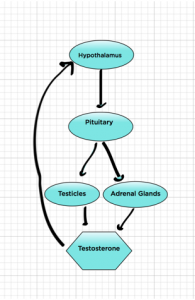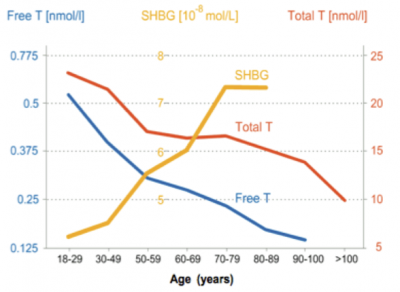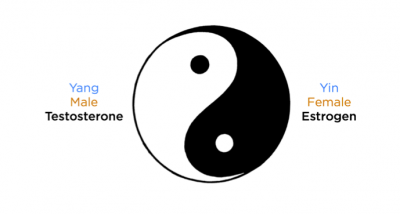When we hear about testosterone, it is often because we catch a whiff of a scandal involving some athlete or celebrity who has been caught juicing (the use of performance-enhancing drugs). If we think a little closer to home, a more realistic way of hearing about testosterone levels is when we start to see the signs that our own levels are dropping. Until then, for a lot of guys, testosterone (and hormones in general) tend to remain an abstraction. The more you know about it the better you’ll be able to protect what you have and extend your vitality, fertility, and longevity.
What is testosterone?
Testosterone is an androgen hormone primarily responsible for male characteristics and features and works in balance with estrogen – which expresses females characteristics. They are collectively known as gonadotrophins and get their name from where they are produced: testosterone in the testes, and estrogen in the ovaries. Men and women have both testosterone and estrogen. The systems that produce them are similar, involving feedback of messages between the gonads and the brain through the endocrine and nervous systems. Men not only have more testosterone, but they use it up much faster than women and, in turn, produce more, faster as well.
Here are the nuts and bolts of how testosterone is produced in men
Through a negative feedback loop, the brain – specifically the hypothalamus – is signaled that blood levels of testosterone are low. The hypothalamus then conveys a message to the pituitary gland, which secretes hormones, to produce more testosterone.

This production cycle picks up speed during puberty and it continues until about the age of 35. After that there is a progressive, gradual decline of about 1% per year.

Types
Not all testosterone that is produced is available for the functions we associate with it. Shortly after it is released, much of your testosterone attaches to proteins and tests for levels will produce a couple of numbers.
1) Bound testosterone is chemically bound to a protein (either sex hormone-binding globulin (SHBG) or albumin). This binding makes it “inactive”.
2) Free testosterone on the other hand is available to bind to other receptor sites on androgen cells.
Why is it important?
Testosterone sometimes gets a bad reputation as just one of the steroids that gym rats amp themselves up with. But testosterone is an important hormone that has many important functions in the body. While its role varies at different ages, a few of the general benefits of healthy testosterone levels include:
- Plenty of energy
- Happy moods
- Strong bones
- Healthy sex drive
- Fertility
- Increased muscle mass
- Clear mind
- Confidence
How do you know it is low?
If we understand what healthy levels of testosterone look like, the signs of low testosterone are fairly predictable and can include:
- Fatigue
- Weight gain
- Sugar metabolism
- Low libido
- Erectile dysfunction
- Poor motivation
- Mood swings irritability
- Loss of mental sharpness
- Reduction of muscle mass
- Cardiovascular disease
Can you have too much?
Testosterone provides a good illustration of the difference between “high” and “optimal” levels. As men age, it’s natural to want to supplement their waning testosterone. As a hormone though, it is important to keep your testosterone in balance. This isn’t one of those “more is better” situations. Too much testosterone can lead to mood swings, shrunken testicles, acne, fluid retention and other conditions reflecting hormone imbalance.
Preserving health
The concept of optimal balance is at the heart of Chinese medicine. By recognizing that the substances and forces that govern our health work in relation to one another, we are able to establish and maintain health.
As I mentioned earlier, testosterone is generally associated with Yang, male characteristics, while estrogen is traditionally identified with Yin, female qualities. Understanding their relationship in each unique patient allows us to effectively use acupuncture and Chinese herbal medicine to help them be their best.

Other things that you can do
As it turns out, taking healthy steps to maintain ideal testosterone levels include things that are just generally good for you. Here are some of the natural ways to keep your testosterone levels where they belong.
- Nutrition – Cruciferous vegetables like broccoli, cauliflower, and cabbage help to remove estrogens that lower testosterone.
- Healthy amounts of cholesterol bearing foods – Cholesterol, a building block for hormones, can help to build up your testosterone. So, cholesterol is actually important and shouldn’t be eliminated entirely from your diet.
- Sleep – This is when our body produces testosterone the most. So, not enough sleep means not enough testosterone being produced.
- Caffeine – Too much is not a good thing, as it can affect your sleep.
- Supplements that can help include:
- D3 – deficiency of this vitamin is associated with lowered testosterone levels
- Omega 3’s – help to lower SHBG (the protein that testosterone binds to)
- Exercise – In men, moderate amounts help increase production and reduces estrogen.
- Sex – Sex is able to stimulate the production of testosterone, which, in turn, boosts your libido.
- Manage stress – cortisol levels that are raised by stress are inversely related to testosterone.
- Environmental exposure – Xenoestrogens, found in plastics, are compounds that mimic estrogen and can have negative effects on testosterone. Also, avoid unnecessary contact with petrochemicals and gas, pesticides (eat organic). Never heat or cook in plastic containers.
- Medications – there are some prescription drugs, as well as over the counter ones, that can negatively affect testosterone levels. Here is a list of some of them.
There’s no single thing that will boost your testosterone naturally for the long term. These changes like most meaningful things, come over time through healthy eating and lifestyle choices.
If you have any concerns about your testosterone levels or medications that you are on which may be affecting them, speak with your MD.






